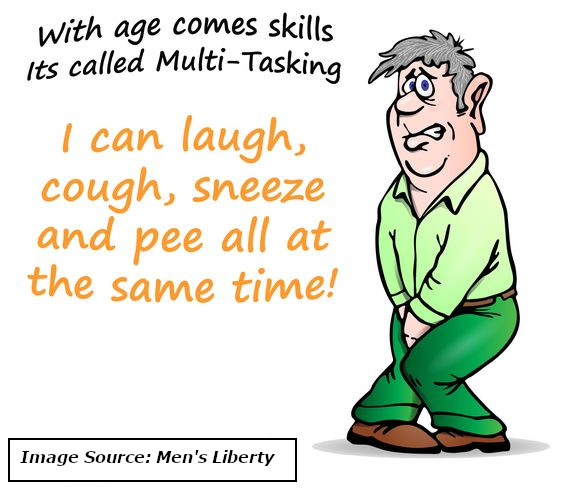Incontinence is the inability to control when we wee and/or poo and it affects our bladder, bowel, and pelvic floor health. It is one of the biggest health and wellbeing issues in Australia affecting 1 in 4 Australians over the age of 15 years. It is estimated 1 in 6 men are affected by incontinence.
Why is this a problem? The majority of people (blokes in particular) choose not to discuss the issue with a GP or anyone because it is embarrassing and difficult to talk about. In the work we do, we have had many discussions with blokes who have self-diagnosed their urine leakage and are wearing a pad to mask their problem rather than acting and visiting a GP.
Poor bladder control can happen due to many health issues:
- Enlarged prostate – as we get older the prostate gets larger and for some men (1 in 4) this will cause bladder problems (refer Chapter 9 of this book – Understanding our Prostate)
- Prostate Cancer – incontinence is a common occurrence post prostate surgery.
- Poor pelvic floor muscles (EEK! – as a bloke do I have a pelvic floor?)
- Nocturia – having to wake up at night to pass urine and can be a part of many common medical conditions.
- Some medicines may cause the bladder to store urine, putting pressure on it.
- Diabetes
A lot of blokes will avoid social activities and be upset and/or anxious by their incontinence. If you observe any changes in your bladder control, make an appointment to talk to your doctor or contact the National Continence Helpline as they can advise you on the most appropriate health professional to see. The treatment for incontinence will depend on its cause, which in discussion with your doctor or other health professional can lead to you choosing the best option for you.
There are treatment options to regain control, improve and manage incontinence:
- Prostate surgery – If you have an enlarged prostate, there are many surgical options.
- Pelvic floor training – pelvic floor muscle training strengthens the muscles to help control both the bladder and the bowel. We all need to have strong pelvic floor muscles.
- Bladder training – can help teach the bladder to hold more urine without leaks and urgency.
- Medicines – there are a range of medicines that can help with bladder control.
- Continence products – these are available to help cope with leaks etc.
Incontinence may be preventable, many bladder and bowel issues can be cured, managed and/or made significantly better. It may start as a bit of after dribble at the urinal, but that is a sure sign we need to have a chat with our doctor and eliminate the causes for it. You are not alone.
For more men’s health & wellbeing information, check out our Working with Warriors® Podcast Series which is based on conversations around men’s wellbeing and health from our Working with Warriors® education sessions. The short podcasts, regarding a man’s approach to his wellbeing and health, are now available to listen via our website or on Spotify, Apple Podcasts, Google Podcasts, and numerous other podcast directories.
Owen and the Team
The Regional Men’s Health Initiative
delivered by Wheatbelt Men’s Health (Inc.)
PO Box 768, Northam WA 6401
Phone: 08 9690 2277




Comments are closed.